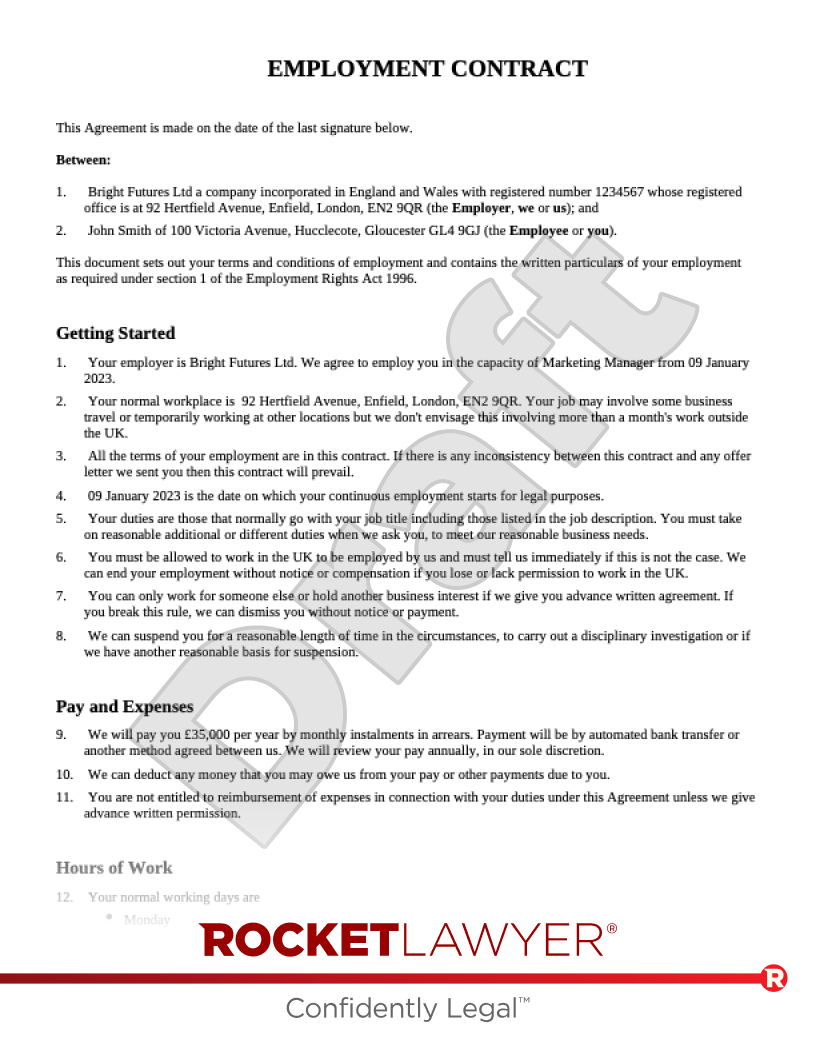What written information must be given to employees?
When somebody starts their employment with you, there is certain written information that you must give them. Some of this information must be provided in a written statement of employment particulars, a document which is often included within an employment contract.
Other information that you must give employees includes information about health and safety, grievance procedures, and disciplinary procedures. It’s up to the employer how they want to provide most of this information. Creating employment documents like contracts of employment, employment policies, and job offer letters is a good way to communicate this information clearly and reliably.
A written statement of employment particulars
You must give all employees and workers a written statement of employment particulars on their first day of starting work.
What is a written statement of particulars?
This document sets out the main conditions (or ‘terms’) of the employee’s employment. It must include details such as when and where the employee is expected to work, their pay provisions and what their work will include.
The written statement of particulars is usually provided within a written employment contract.
The written statement should also say whether or not any staff handbook or rules the employer has in place are contractually binding (ie whether they form a part of the employee's contract of employment). Some rules may be contractually binding while others are not, so it’s important that the written statement clearly sets this out.
For more information, read Written statement of particulars.
Is a written employment contract necessary?
An Employment contract is a legal agreement between an employer and an employee, which sets out both parties’ rights and duties.
When is an employment contract legally binding?
All employees are deemed to have a legally binding employment contract with their employer once they begin working for them, even if there is no written document.
An employment contract can sometimes be formed before employment commences, for example, if somebody accepts an unconditional offer of employment, the terms of which have been set out in a clear and definite way. This can be done entirely verbally.
Should I have a written contract of employment?
Although an employment contract can be formed without anything needing to be written down, employers are strongly encouraged to create written employment contracts to make everything clear. This can ensure an employer’s expectations of their employee are made clear and can help to avoid disputes.
An offer letter
Some employers also use a Job offer letter with conditions to precede the employment contract or to deal with employment pre-conditions, such as the employee passing pre-employment checks. For example, an offer letter could explain that an offer of employment is conditional on the employee satisfying reference checks.
Offer letters are not essential, but they can help the hiring process to progress with clarity.
Written employment policies
It is recommended that employers have various written employment policies in place. HR policies help employers communicate their approach to various different aspects of employment, for example, different types of leave that employees can take and practices they should follow whilst working. Having comprehensive employment policies in place also helps employers to comply with their employment law obligations and helps everyone know how to deal with any workplace issues.
What employment policies are required by law?
Having employment policies is not a legal requirement. An exception to this is the requirement that employers must always have a Health and safety policy, and if they employ 5 or more people, this must be written down. Further, there is certain written information that must be given to employees, which is normally covered in policies. This includes:
-
any disciplinary rules and the process for disciplinary action and appeals, often contained in a Disciplinary procedure
-
the process that employees should follow if they have a grievance, and the steps that will be taken following submission of a grievance. This is often contained in a Grievance procedure
-
information on how any employee’s personal data is collected, processed, and stored. This can be communicated with reference to a Data protection and security policy and an Employee privacy notice
It is also a good idea to have an Equal opportunities policy in place early on to help deal with the tricky area of discrimination law.
As employers grow in size, there are many other policies that can help you to maintain a compliant and productive workplace. For more information, read HR policies and procedures.




